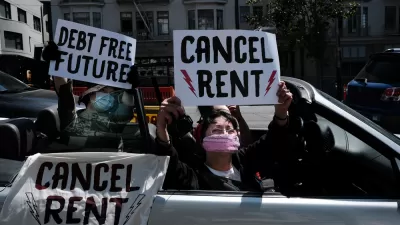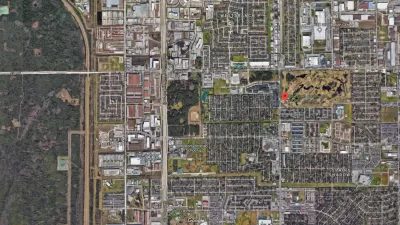The Houston region continues to grow, and local regional governance is struggling to meet residents’ needs.

A new report from Rice University’s Kinder Institute for Urban Research looks at growth in the Houston region and the struggles cities, counties, municipal utility districts (MUDs), and special districts face in providing municipal services to developing areas. “How do we ensure that all areas of those jurisdictions get the services they need and that those jurisdictions have the revenues and powers they need to adequately serve those areas?” asks Kyle Sheldon, one of the report’s authors, in an interview on Houston Matters.
Shelton says MUDs, prevalent in Harris County, are special districts in the state of Texas with property tax collection and other powers that help them build public infrastructure in areas that a city cannot or does not want to reach. However, the system has become complicated and confusing, says Shelton. “There are a lot of growing populations in those areas, and they have expectations for services and may not always understand the county is not the water provider, [that] the county does not do all the same things that the city does.”
One reform proposal is regional revenue sharing, where all jurisdictions in an area pay into a shared pot that is then redistributed. “That would help address some of the disparities we have in some jurisdictions: not being able to adequately maintain water treatment facilities or adequately maintain streets. It helps all of those jurisdictions without overturning existing systems or asking people to drastically change the government structure,” says Shelton. Other options at the county level include giving fast-growing counties sales tax and limited ordinance-making powers.
Shelton stresses that thinking at the regional scale and about regional vitality is important. He notes that Houston chose to grow and to be responsible for providing services to a massive area. He says that MUDs are providing many of those services effectively, and parts of the system are working well. However, the various entities need to be strengthened to prepare for the long-term regional challenges.
FULL STORY: Report: Houston Growth Is Unsustainable Without Government Reforms

Planetizen Federal Action Tracker
A weekly monitor of how Trump’s orders and actions are impacting planners and planning in America.

San Francisco's School District Spent $105M To Build Affordable Housing for Teachers — And That's Just the Beginning
SFUSD joins a growing list of school districts using their land holdings to address housing affordability challenges faced by their own employees.

The Tiny, Adorable $7,000 Car Turning Japan Onto EVs
The single seat Mibot charges from a regular plug as quickly as an iPad, and is about half the price of an average EV.

Vehicle-related Deaths Drop 29% in Richmond, VA
The seventh year of the city's Vision Zero strategy also cut the number of people killed in alcohol-related crashes by half.

Seattle's Plan for Adopting Driverless Cars
Equity, safety, accessibility and affordability are front of mind as the city prepares for robotaxis and other autonomous vehicles.

As Trump Phases Out FEMA, Is It Time to Flee the Floodplains?
With less federal funding available for disaster relief efforts, the need to relocate at-risk communities is more urgent than ever.
Urban Design for Planners 1: Software Tools
This six-course series explores essential urban design concepts using open source software and equips planners with the tools they need to participate fully in the urban design process.
Planning for Universal Design
Learn the tools for implementing Universal Design in planning regulations.
Smith Gee Studio
City of Charlotte
City of Camden Redevelopment Agency
City of Astoria
Transportation Research & Education Center (TREC) at Portland State University
US High Speed Rail Association
City of Camden Redevelopment Agency
Municipality of Princeton (NJ)





























